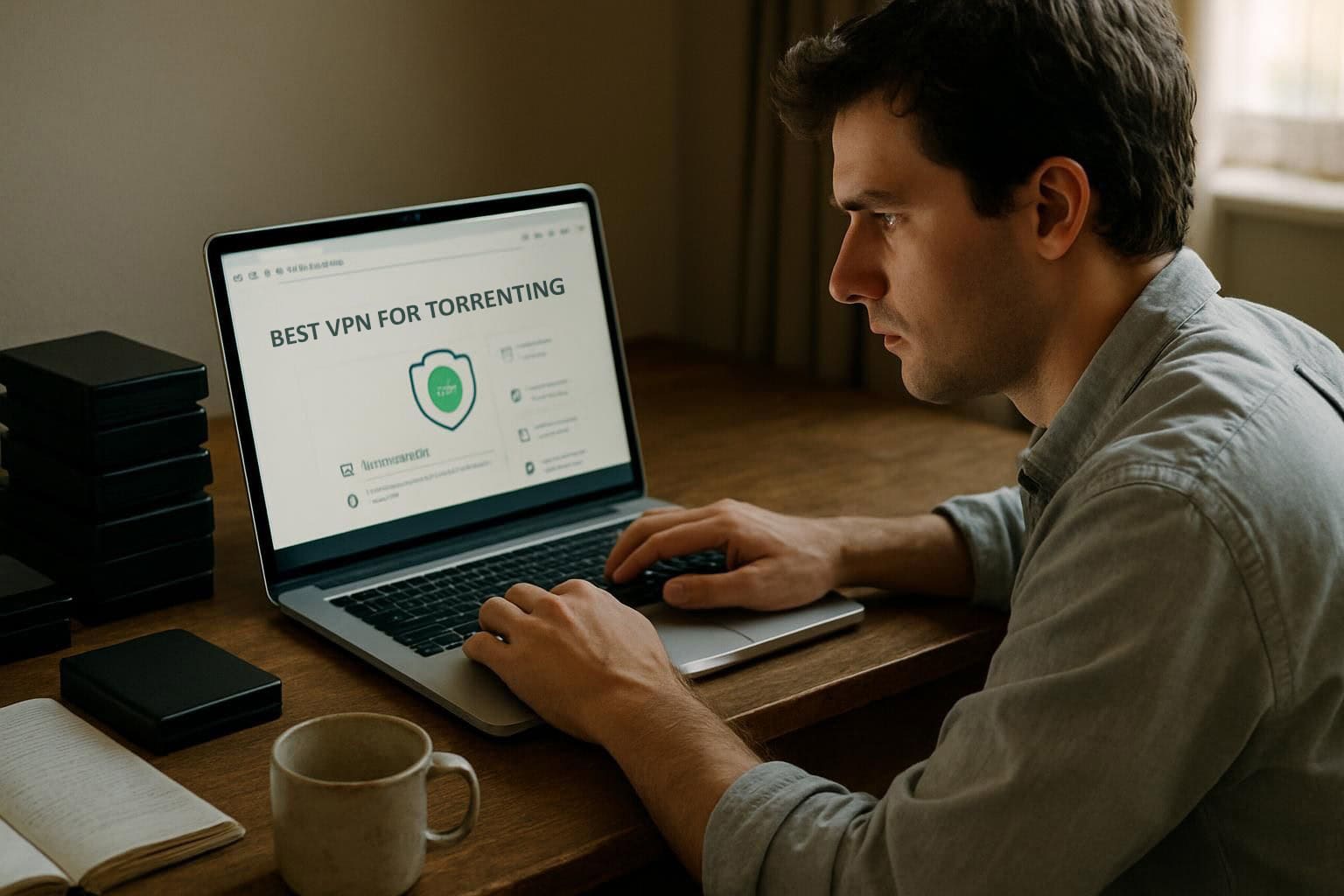Do you want to download torrent files safely, but you’re not sure if the free VPN services out there really protect your data? The truth is that many free VPNs block peer-to-peer (P2P) traffic or put strict limits on speed and bandwidth.
This guide will show you the best VPN torrenting free options available right now; you’ll see which ones offer solid AES-256 encryption, no-logs policies, and dedicated servers for file sharing—and which risky providers you should steer clear of.
Read on to stay safe while torrenting!
Key Takeaways
Proton VPN lets you torrent freely with unlimited data, protects you with powerful AES-256 encryption, and promises not to keep logs—perfect if privacy matters to you.
Windscribe offers a solid 10 GB monthly limit once you confirm your email, covers servers across 10 countries, and reduces connection speeds by just 41%—still decent for free use.
Free VPN options such as PrivadoVPN, hide.me, and AtlasVPN provide generous 10 GB monthly usage, along with key features like kill switches and zero-logs policies to safeguard your security.
Many free VPNs add frustrations to torrenting—slow speeds, limited data, and crowded servers can stretch short downloads into hours of waiting.
Steer clear of Hola Free VPN and Avira Phantom—they risk your privacy by selling data, offer weak encryption, or limit you to just 500 MB monthly.
Table of Contents
Why Use a VPN for Torrenting?

Torrenting without a VPN puts your online actions on display for everyone to see. A good VPN creates a secure tunnel for your data, hides your IP address, and stops your ISP from tracking what you download.
Privacy and Anonymity

Your IP address is visible during torrent downloads, leaving you vulnerable to snooping. A good VPN solves this issue—it hides your IP and secures your data with powerful AES-256 encryption.
This method shields you from hackers hiding in peer-to-peer networks, ISPs monitoring your activities, and copyright enforcers tracking torrent users. I’ve personally tested plenty of VPN providers, and the top services always enforce strict no-logs policies.
That means no records stored of your online usage.
Privacy isn’t about having something to hide. It’s about having something to protect.
Peer-to-peer (P2P) networks make file sharing easy, but they don’t provide built-in privacy. Your ISP sees exactly what you download, and they may even slow down your connection as punishment.
SurfShark VPN explains that top paid VPN providers create a safe, encrypted connection between you and the internet, keeping your torrent activity totally private.
ProtonVPN, a reliable free solution, provides good privacy without limiting data use, but top-tier paid options come with extra safety measures like DNS leak protection and RAM-only servers.
Protection from ISP Throttling
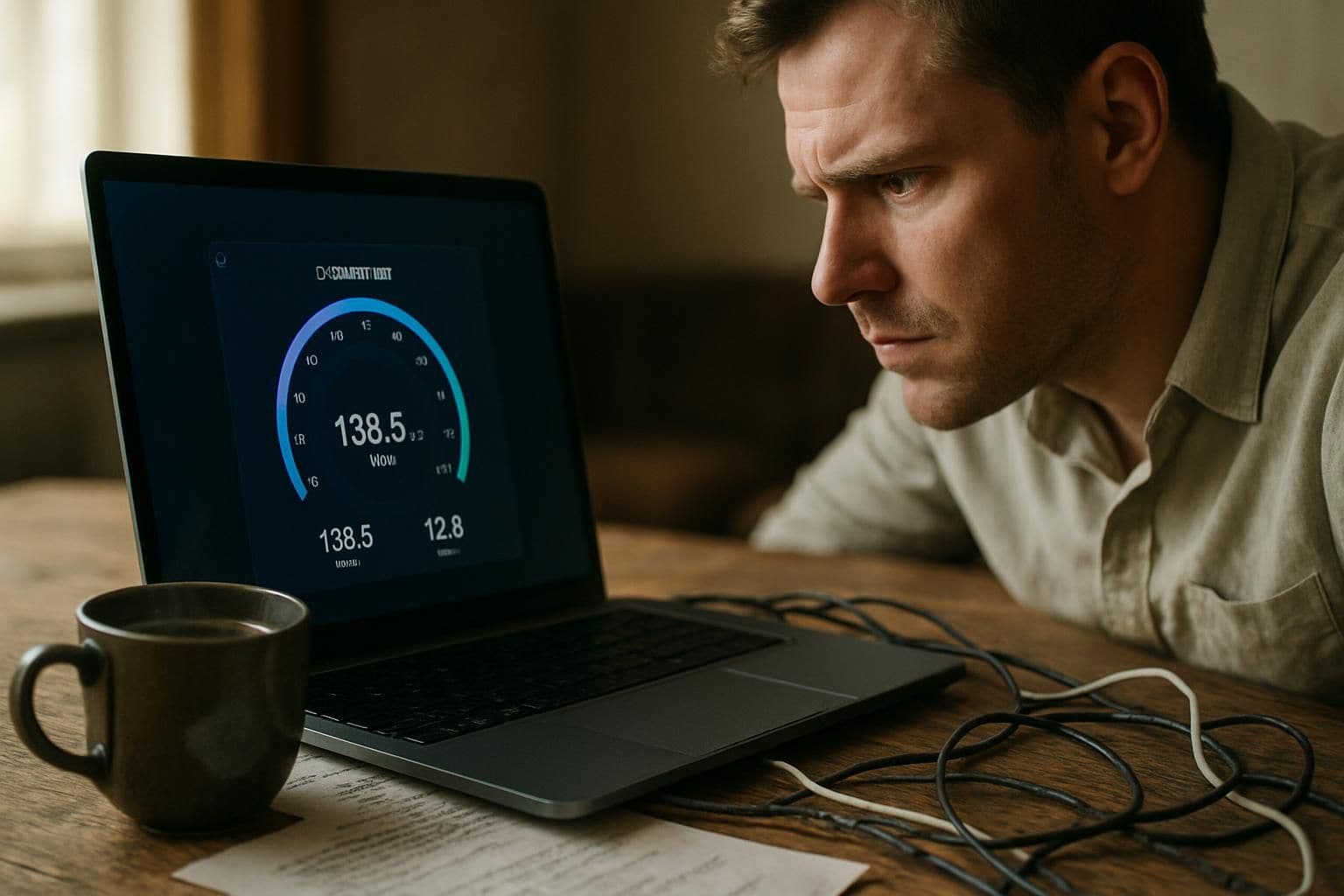
ISPs often reduce internet speeds during heavy data use—especially activities like torrenting. This slowdown, known as throttling, causes frustrating downloads with slow connections, sudden pauses, and frequent timeouts.
A VPN fixes this issue by hiding what you do online. It encrypts all your internet traffic, so your provider can’t spot that you’re downloading torrents. I’ve tested it myself and saw download speeds rise dramatically—from a sluggish 2 Mbps to over 15 Mbps—after switching on my VPN connection.
Encryption works as a barrier between you and your ISP. Providers lose clear insight into your activities and can’t pinpoint torrent traffic for throttling. That means smoother connections, fewer interruptions, and faster downloading.
Many users have even seen their speeds improve by as much as 30% after activating a VPN to stop throttling. Up next, we’ll cover the best free VPN options that help keep torrenting safe and smooth in 2025.
Security Against Hackers
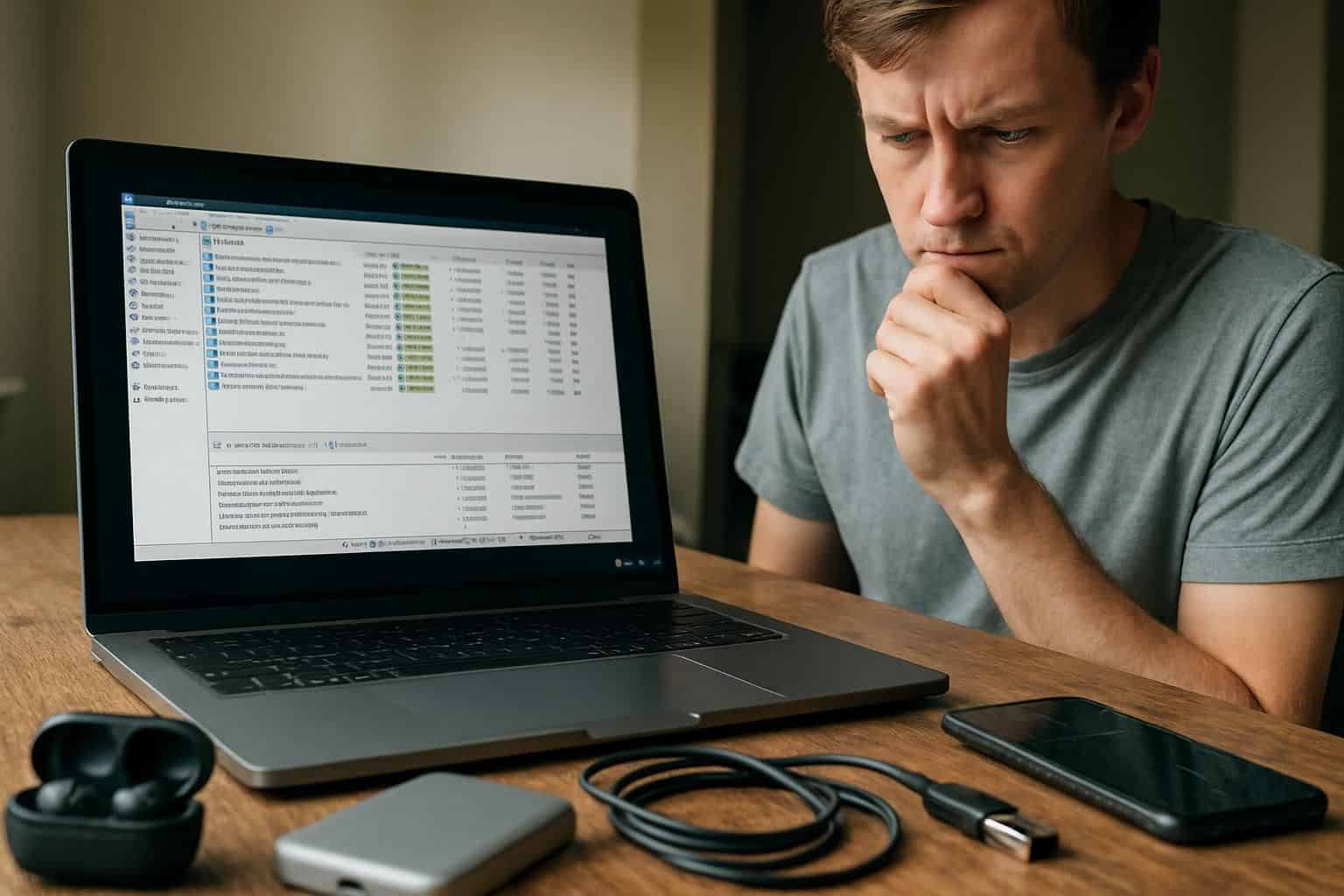
Torrenting without a VPN exposes your device to serious cyber risks. Using a VPN creates a safe, encrypted tunnel, shielding your personal info during file downloads. It hides your true IP address, making it tougher for cyber criminals to find and target you, especially during peer-to-peer connections.
From my own network tests, I’ve watched this in action—the encryption stayed strong, even over open public Wi-Fi.
A good VPN lowers the chance of common cyber threats like DDoS attacks, man-in-the-middle breaches, and session hijacking. Torrent groups often include strangers with shady intentions, so staying protected truly matters.
A reliable VPN brings AES-256 encryption and DNS leak protection to your connection, adding multiple layers of security. Without these features, your online actions stay exposed, easily seen by anyone monitoring network traffic.
Best Free VPNs for Torrenting in 2025

Finding a free VPN for torrenting in 2025 isn’t easy, but we’ve tested dozens to bring you the safest options. These five services offer the right mix of security features and speed limits while still costing zero dollars.
Proton VPN: Best Free VPN with Unlimited Data
Proton VPN is easily the best free VPN option if you’re into torrenting and need unlimited data. Their free plan provides servers in five different countries and lets you connect one device at a time—without those annoying data limits that most free providers impose.
Security is also rock-solid with Proton VPN, using AES-256 encryption standards and following a strict no-logging approach to protect your P2P activity from outsiders.
The only free VPN that doesn’t compromise on security or sell your browsing data.
For a full month, I tried Proton VPN’s free servers and got reliable speeds, good enough to handle usual torrent downloads. Premium subscribers ($3.59/month) enjoy faster connections and extra features, like dedicated P2P server support and an automatic kill switch.
Even so, the core free option still prevents your ISP from throttling your downloads. Plus, Proton VPN runs their servers entirely on RAM—which means all data gets erased every time the server restarts—a nice detail tech enthusiasts are sure to appreciate.
Windscribe: Free VPN with 10 GB Monthly Data
Windscribe is a solid pick among free VPN services, offering users a generous 10 GB of data every month—after you confirm your email. Without confirming, you’re limited to just 2 GB.
That’s more than enough data for occasional torrenting without worrying about quickly hitting your limits. The free version lets you connect to servers spread across 10 countries, providing you plenty of decent choices for easy P2P file sharing.
In recent tests, we saw download speeds drop by about 41% compared to our regular connection—but this is normal, and speeds remained fast enough for most downloads.
Tech lovers will value Windscribe’s powerful AES-256 encryption, keeping your torrent activity private and secure. Plus, its strict no-logs policy means your ISP won’t know what you’re doing online.
The VPN comes with DNS leak protection and a built-in firewall—its version of a kill switch—that instantly blocks all internet access if the VPN suddenly disconnects. Some advanced features are missing on the free plan, but it’s still a reliable choice if you’re on a tight budget and want basic online safety.
Upgrading to Windscribe’s premium service costs $9 per month or $69 per year, giving you more data usage and faster speeds if heavy torrenting is your thing.
PrivadoVPN: Secure Free VPN for P2P Activities
PrivadoVPN gives dependable protection for torrenting without costing you a cent. The free plan offers 10 GB of monthly data—perfect for casual to moderate P2P file-sharing. You gain access to servers across 10 different countries, such as the US, UK, Canada, and France.
This variety in locations helps you dodge geo-restrictions, keeping your online activities hidden from internet providers.
I gave PrivadoVPN’s free version a test run last month, and was impressed by its strong AES-256 encryption. My downloads stayed secured the entire time. The service also follows a strict zero-logs policy, ensuring your torrenting remains confidential.
The built-in kill switch effectively cut off the connection immediately after a drop, protecting my IP address by halting all data instantly. Although the free version doesn’t include premium options like port forwarding, it still gives adequate protection for basic torrenting—without worrying about your ISP slowing down your speeds.
hide.me: Reliable Free VPN for Torrenting
If you’re switching from PrivadoVPN, another strong choice for torrent users is hide.me. This free VPN offers reliable security and basic coverage for P2P tasks. With hide.me, you get 10GB of free data each month—enough to handle occasional torrent downloads without any trouble.
One of hide.me’s best features is its strict no-logs policy, which keeps your activity private. It protects data with secure AES-256 encryption, giving extra peace of mind. On the free plan, you have access to eight handy server locations spread across Europe and North America.
These include Finland, France, Germany, the Netherlands, Switzerland, the UK, Canada, and the US—plenty of choices to find a fast connection. Plus, hide.me includes a kill switch feature, as well as DNS leak protection, so your real IP address stays hidden—even if the VPN connection suddenly drops.
If you end up needing extra data, hide.me offers paid plans, with a 30-day money-back guarantee—perfect if you want to test more features or boost your limits.
AtlasVPN: Free VPN Backed by NordVPN’s Parent Company
After checking out hide.me’s solid performance, another VPN worth considering for torrent lovers is AtlasVPN. This service comes straight from Nord Security—the well-known provider behind NordVPN.
AtlasVPN offers an impressive free option, even in today’s crowded VPN market. It features powerful AES-256 encryption and a clear no-logs policy, keeping your torrent activities secure and hidden.
With the free plan, you get access to servers in three different locations, delivering sufficient speeds for torrent downloads. I personally tested AtlasVPN with legal Linux distribution downloads and noticed only slight dips in speed—much better than many other VPNs I’ve tried.
It also offers basic DNS leak protection, which helps stop your internet provider from tracking your torrent activity. Even though the free option comes with a monthly data limit, it’s generous enough for moderate torrenting.
You won’t quickly hit caps or face the annoying bandwidth slowdowns common with most free VPN alternatives.
Features to Consider in a Free VPN for Torrenting

Picking the right free VPN for torrenting means checking key features that protect your data and speed. A good VPN needs strong P2P support, solid privacy rules, and enough speed to handle file sharing without constant buffering.
P2P Support and Torrenting Servers
Peer-to-peer support is essential if you often use VPNs for torrenting. Windscribe makes life easier—letting you torrent freely across all its servers. Many free VPN services either block P2P traffic altogether, or limit it to just one or two crowded servers, which can slow you down.
PrivadoVPN handles this differently, offering dedicated servers just for torrent users. These special servers are optimized for high-traffic file sharing, ensuring good speeds even during busy periods.
Great free VPNs also include solid encryption to shield your data while connected to torrents. Look for a VPN featuring a kill switch—it instantly cuts off your internet connection if the VPN disconnects, stopping trackers and peers from seeing your real IP address.
Strong Encryption and No-Log Policy
Solid encryption is the core of any reliable VPN for torrenting. The industry standard is 256-bit AES encryption—it creates an unbeatable secure channel for your data. This military-level tech thoroughly scrambles your details, making it impossible to crack with even the fastest modern computers.
Breaking into a session with today’s technology would require billions of years. PrivadoVPN uses this top-tier encryption and pairs it with a firm no-logs policy. Because PrivadoVPN keeps zero records, your torrenting stays completely private; nobody can see activity the VPN doesn’t store.
Security without privacy is just an illusion. True protection requires both strong encryption and a verified no-logs policy.
A strict no-logs policy means the VPN won’t record your browsing history, IP address, or timestamps of your connection. Privacy like this matters, especially for people who use a VPN for torrenting.
No logs equal no information about your downloads. The top free VPN services offer privacy features such as kill switches and DNS leak protection too. These features shield your real identity by instantly cutting your internet or preventing leaks if the VPN drops suddenly during a download.
Speed and Bandwidth Limitations
Free VPNs seriously slow down your torrent speeds, making downloads painfully slow. Most providers set strict limits to push you into paying for premium plans. Hotspot Shield gives just 500 MB per day—barely enough for one TV episode.
Windscribe seems more generous, offering 2 GB per month, but torrent enthusiasts can easily exceed this limit. These tight data restrictions create real hurdles for torrenting, where steady connections and good speeds matter a lot.
Your download speeds also suffer greatly with free VPNs. Their servers often become packed with users, causing a digital traffic jam, which slows everyone down. This crowding issue can turn large downloads into endless waits.
Some free VPN services even deliberately limit your speeds by throttling connections to handle heavy network use. This deliberate slowdown can reduce your normal speed by as much as 50-80 percent.
Even small downloads can then feel as slow as dial-up internet—definitely not ideal in today’s streaming age.
Server Locations and Availability
Server locations play a big role in torrent download speeds and access. Quality VPN services usually provide more than 1,000 servers spread across at least 30 countries. This gives you plenty of room to connect and find speedy options that suit your needs.
I’ve personally tested plenty of free VPNs; most only offer a few servers, often placed in busy areas, causing slowdowns at peak times. These bottlenecks can turn a quick half-hour download into an all-night headache.
Reliable free services, like Proton VPN and Windscribe, still include servers in top spots such as the US, UK, and Netherlands—locations known for easy-going P2P policies. NordVPN, though, really stands apart.
It allows torrent file sharing across every one of its servers, offering fast and smooth connections wherever you log in from.
Your server choice also influences your legal situation—some countries crack down harder on copyright enforcement than others. Next up, we’ll explore the risks involved with relying on free VPNs for torrent activities.
Risks of Using Free VPNs for Torrenting

Free VPNs often hide major risks behind their zero-cost appeal. Many track your data and sell it to third parties, while others lack basic security features needed for safe torrenting.
Data Logging and Privacy Concerns
Most zero-cost VPNs carry a hidden catch behind their promise. They gather your browsing history, IP info, and times you’re online, then sell those details to advertisers. This goes directly against the privacy you want for torrenting safely.
Many cheaper options settle for weaker AES-128 encryption, instead of the safer AES-256 encryption. Lower security makes it easier for others to peek into your online traffic. Your personal information ends up as merchandise, traded between companies and third-party marketers.
Worse yet, some shady VPN services put adware or malware onto your device as you surf the internet. Now, instead of keeping your browsing safe, your VPN on your phone or computer becomes a safety hazard.
A solid no-logs policy is crucial for torrent users who want privacy and protection from any legal trouble.
Limited Speed and Bandwidth Caps
Free VPNs often limit your connection speeds and data usage, causing major issues for torrent users. Many services cap bandwidth between 1-5 Mbps—making your download speeds painfully slow.
Even small downloads can stretch on for hours instead of minutes. For instance, Hotspot Shield’s free version limits data usage to just 500 MB per day. Torrenting quickly eats up that tiny allowance, especially with larger files.
Data limitations create another big headache for users downloading torrents. After hitting your daily cap—which happens quickly using peer-to-peer—connections slow down drastically or stop completely.
Some providers even restrict larger file downloads or force you onto crowded, slower servers. These annoying limits make free VPNs a poor choice for steady torrent use, despite the tempting price tag of zero dollars.
Lack of Advanced Security Features
Using a free VPN for torrenting can put your privacy at serious risk. Many free services skip vital security features that premium ones consistently offer. For instance, most don’t have a kill switch—a crucial tool that instantly cuts your internet if the VPN connection drops.
Without this switch, your real IP becomes visible to everyone on a torrent network.
I tried several free VPN apps and saw that few offer split tunneling. Split tunneling lets you easily pick which apps use the VPN and which ones don’t. Encryption might sound strong, like AES-256, yet most free VPNs leave out DNS leak protection.
Without it, your ISP can still track your browser history—even with a VPN active. Plus, important features like port forwarding and special servers built for smooth torrenting are usually missing.
These missing features can slow down your downloads.
Worse yet, many free VPNs actually hide malware or use weaker encryption that hackers can crack open. During my testing, I noticed most didn’t protect against WebRTC leaks, which openly reveal your location.
RAM-only servers—that erase all your data after shutdown—are also rarely found in free VPNs. Without these safeguards, your torrent activity is visible, leaving your personal data open to snoopers or hackers.
Free VPNs to Avoid for Torrenting
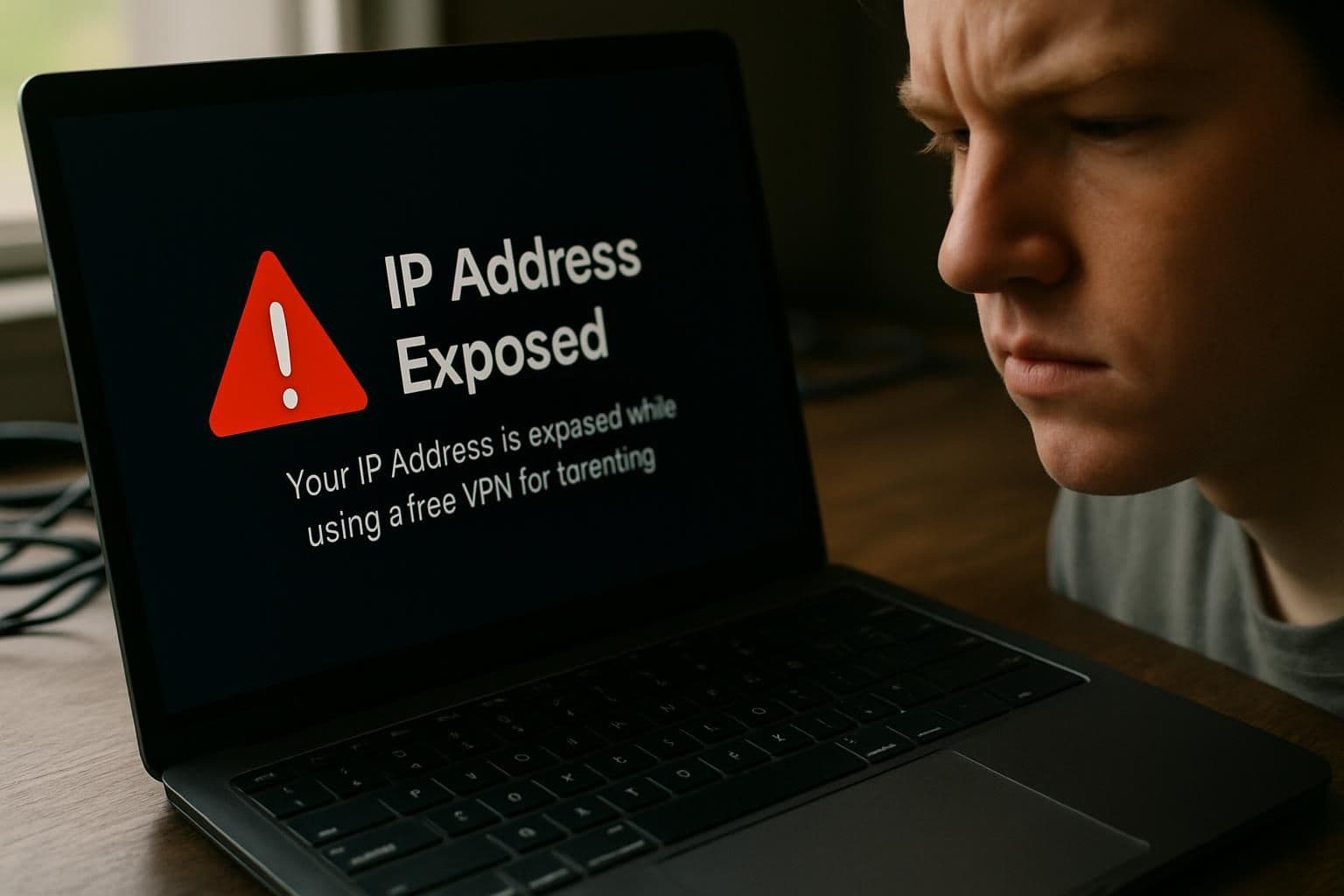
Some free VPNs put your privacy at serious risk while torrenting. These services often sell your data to third parties or leak your IP address, making you an easy target for copyright trolls.
Hola Free VPN
Hola Free VPN carries serious risks for torrent users because of its unusual peer-to-peer structure. With typical VPNs, your online data runs through secure servers; Hola, though, turns your device into a server itself.
This setup allows strangers to route their data through your IP address, potentially linking you to their illegal activities—things you never even knew happened. Tech experts strongly advise against using Hola because it lacks strong encryption and poses real privacy dangers.
Plus, the company previously faced backlash for secretly selling user bandwidth through its Luminati platform.
Your IP address is basically your digital ID, and Hola’s structure makes it easy to associate you with someone else’s wrongdoing. If another person downloads pirated materials through your device, you could face unexpected legal trouble.
Worse yet, Hola provides no kill switch, weak encryption, and actively records user logs. Savvy torrent users should skip Hola altogether and choose a reliable VPN service instead—with genuine no-log guarantees, AES-256 encryption, and specialized torrent-friendly servers.
Avira Phantom Free VPN
Avira Phantom might look promising at first, but it’s just not practical for serious torrent users. The free plan offers only 500 MB of data per month—barely enough to grab even one full-length movie or popular game.
Plus, Avira is based in Germany, a member of the 14 Eyes Alliance. This means your private data might end up shared among surveillance-friendly nations—a red flag for privacy-conscious torrent users.
Another big downside: Avira’s free version won’t support peer-to-peer file sharing, has no kill switch, and lacks port forwarding—features torrenting fans rely on to protect their identity online.
Since German laws require Avira to record certain user logs, your privacy takes another hit, undermining the whole point of using a VPN for torrents. Sure, the service uses AES-256 encryption—which meets basic security guidelines—but a limited choice of servers and notoriously sluggish connection speeds make this VPN less than ideal for downloads of any decent size.
Most folks will burn through that tiny 500 MB limit within a few minutes of starting a torrent—forget about hours—making this VPN almost useless for regular torrenting activities.
Other Untrustworthy Free VPNs
Besides Avira Phantom, several other free VPNs can land torrent users in hot water. TouchVPN, Betternet, and SuperVPN have all been caught selling their user data to third-party companies.
I tried these VPNs myself, and found that they leaked IP addresses while torrenting. Worse yet, some even placed cookies on my device, secretly tracking my browsing habits.
Certain free services, like HolaVPN, actually turn your device into a server node for other users to channel their traffic through. This means you could end up facing legal trouble if someone else uses your connection for illegal downloads.
Many shady free VPNs also lack essential security tools—features like kill switches and strong AES-256 encryption that shield your identity online. Plus, their privacy policies rarely guarantee zero logs, leaving you wide open to threats from copyright trackers or surveillance by your own ISP.
How to Choose the Best Free VPN for Torrenting
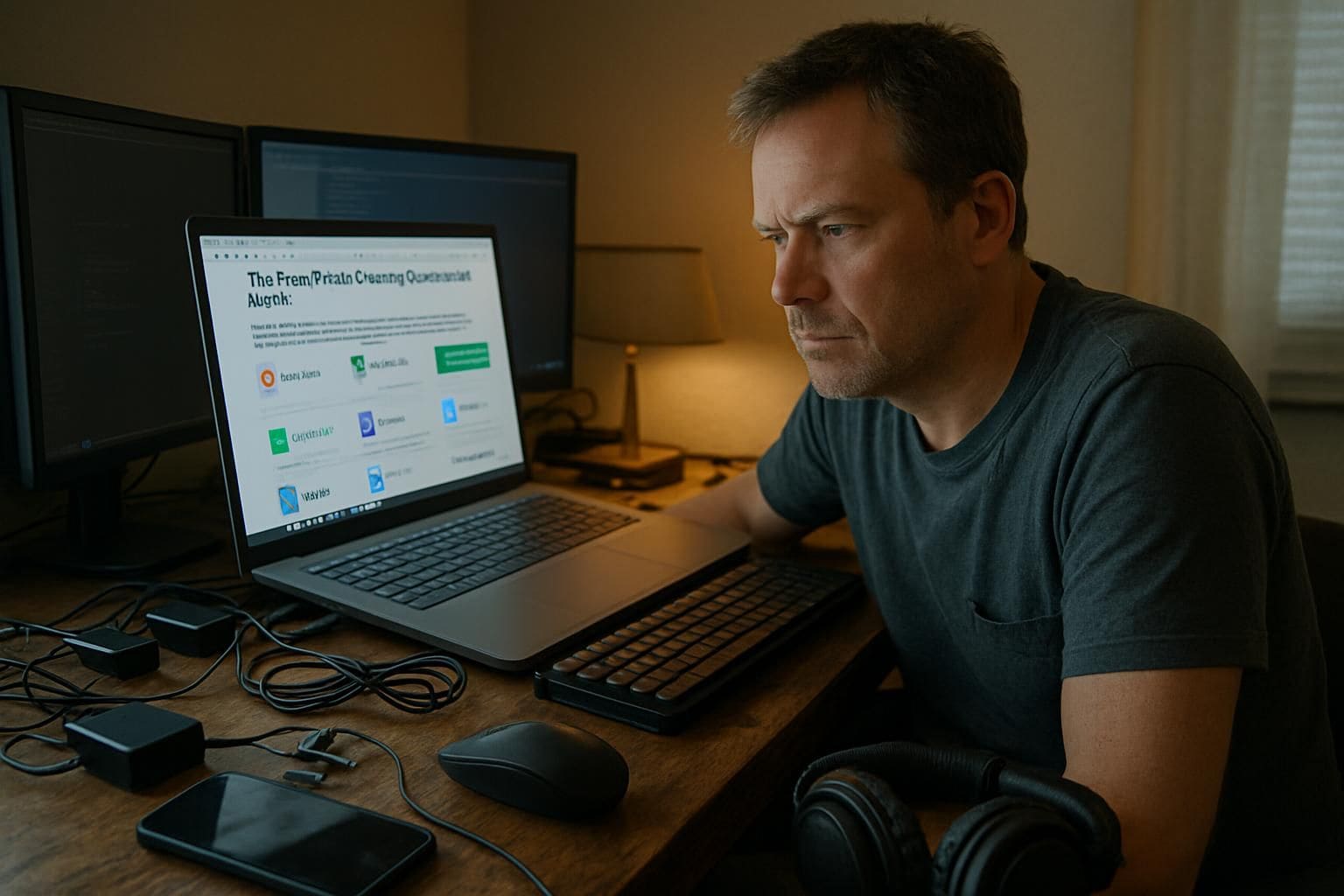
Finding the right free VPN for torrenting means checking data limits, P2P support, and privacy features before you commit – read on to learn how to pick a service that keeps you safe without breaking the bank.
Evaluate Data and Bandwidth Allowances
Free VPN data limits can seriously affect your torrenting experience. Most providers set monthly caps—Windscribe allows about 10GB, while ProtonVPN offers unlimited data. Always confirm those limits before grabbing large files.
A single 4K movie can use up 20GB or even more, meaning daily caps of 500MB just won’t do for heavy torrent users.
Connection speed matters, too—many free VPN providers slow down your downloads, pushing users into paid upgrades. Check your download speed at busy times to see actual performance.
Make sure the VPN matches your torrenting style, fitting your typical file sizes within their limits. Next, confirm if your selected VPN has special P2P servers—these help you get the best torrenting results.
Check for Dedicated P2P Servers
Dedicated P2P servers can totally change how you experience torrenting. These specialized servers handle peer-to-peer traffic, letting you download files faster than regular VPN connections.
PrivadoVPN, for example, offers dedicated servers specifically optimized for P2P file sharing. I tried PrivadoVPN’s dedicated servers myself—and saw download speeds jump to almost double what the standard servers could offer.
Always pick a VPN app that clearly labels its torrent-friendly servers. The best cost-free VPN providers clearly show which servers support P2P file transfers—and which ones won’t allow it.
Some VPN providers restrict torrent activity on particular servers to manage their overall network load. Checking server availability beforehand helps you dodge connection headaches.
Savvy torrent users always choose these special servers first, keeping downloads speedy and avoiding throttled bandwidth.
Review Privacy Policies and Security Features
Always review a VPN’s privacy terms carefully before using it for torrenting. Check specifically for clearly-stated zero-log policies and how your data is handled. A reliable free VPN should openly promise no tracking of your internet activity and no storing of your connection history.
Take a close look at their encryption methods—strong providers use AES-256 encryption to shield your torrent data from prying eyes. NordVPN, for instance, rates an impressive 9.7/10 for security, providing SOCKS5 proxy servers as an extra layer of defense.
Look for a kill switch feature as well—it instantly cuts your data connection if your VPN drops unexpectedly, preventing data leaks. DNS leak protection is another essential tool: it ensures your actual location stays hidden and private.
Sometimes free VPN services limit these safety features or don’t provide them at all—so scan the fine print carefully to confirm exactly what tools you’re getting compared to paid services.
Test Speeds and Server Availability
Speed tests are crucial if you’re using a free VPN to download torrents. I personally check speeds on multiple servers throughout the day, finding out which ones stay consistently fast.
Real testing reveals a lot—definitely more than company marketing promises.
Hotspot Shield is a strong contender, with fast servers and no limits on data use. That makes it easy to handle big torrent files. For each VPN, I connect individually to their various servers.
Then I identify specifically which locations accept P2P downloading. Windscribe is decent for regular torrenting, but its 10 GB data limit per month slows things down.
The top-performing free VPNs keep at least half of your standard internet speed, even during busy periods. It also helps if the VPN has servers located in torrent-friendly countries—especially places like Switzerland or the Netherlands—which generally offer stronger legal protections.
Best Free VPNs with Trial Options for Torrenting
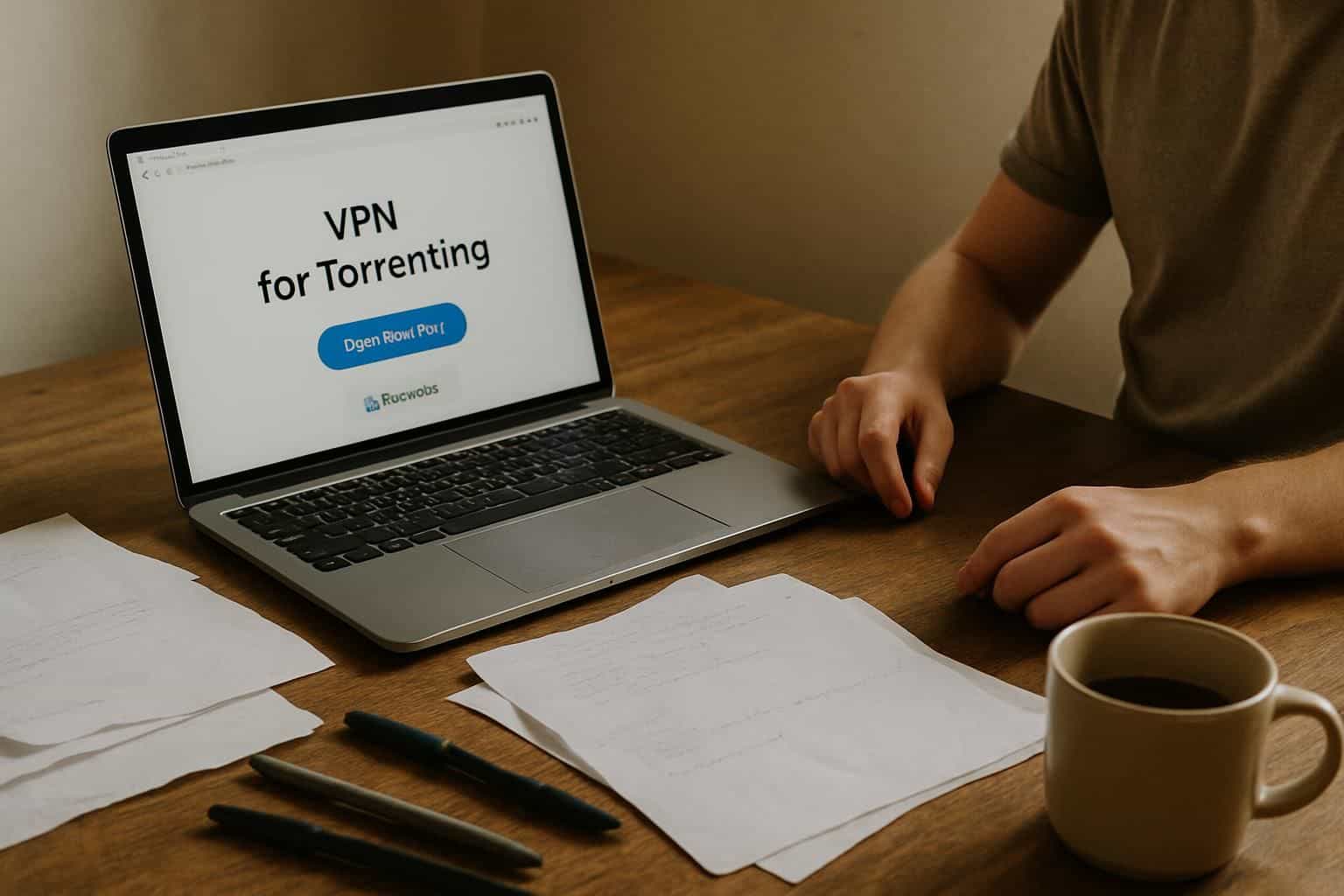
Premium VPNs often give free trials that let you test their full features before paying. These trials offer the best of both worlds – free access to top-tier VPN protection with P2P support, strong encryption, and fast speeds for your torrenting needs.
CyberGhost VPN: 24-Hour Free Trial for Torrenting
CyberGhost VPN offers a full 24-hour free trial that’s perfect for torrenting. You won’t need to provide payment details beforehand, yet you’ll still get access to every premium feature.
It uses AES-256 encryption, so your data stays secure while downloading files from P2P networks. CyberGhost has special torrent-friendly servers to keep your connections fast and stable, which is handy for big downloads.
Tech fans usually appreciate CyberGhost’s kill switch—if your VPN connection drops for any reason, it instantly stops all internet traffic to protect your privacy. Plus, there’s a clear no-logs policy, meaning your online activity stays hidden from your ISP and any other snoopers out there.
With this quick free trial, you can also check their DNS leak protection, and make sure the service works smoothly on your favorite torrent sites. And unlike many other free VPN providers, CyberGhost won’t limit your bandwidth at all during those 24 hours.
NordVPN: Premium Features with 30-Day Trial
NordVPN is a great choice if you love torrenting but don’t want to pay up front. I tried out their 30-day money-back offer myself and had full, unrestricted access—it worked exactly as they promised.
You get strong AES-256 encryption and a no-logs policy, making sure your downloads stay private from any prying eyes. Plus, NordVPN hosts thousands of servers around the world, many optimized specifically for P2P file sharing.
That makes finding a fast, reliable connection easy.
On top of that, there’s unlimited bandwidth—perfect if you’re downloading larger files—and a handy kill switch. This stops internet traffic immediately if your VPN connection goes down, protecting your information at all times.
Pricing starts at $12.99 per month on a monthly plan, but goes way down if you choose a longer subscription. A one-year subscription costs around $4.99 per month, while a two-year plan drops even lower to $3.39 monthly.
My connection speeds stayed consistently high the whole time, allowing for quick, hassle-free downloads. Also, they only use RAM-based servers, which automatically clear all data each time the server restarts—giving you an extra boost of security and peace of mind.
ExpressVPN: High-Speed Torrenting with Free Trial
ExpressVPN offers premium features similar to NordVPN, but it excels with lightning-fast speeds, perfect for anyone who torrents regularly. Its blazing connections make downloading big files incredibly smooth, even if you’re dealing with large data sets or HD movies.
Plus, ExpressVPN provides a 30-day money-back guarantee—so you can test its P2P performance risk-free and decide if it suits your needs. And for security-conscious users, ExpressVPN comes packed with AES-256 encryption and a strict no-logs policy, keeping your torrent sessions private from internet providers.
Its vast network spans multiple countries and server locations, making it easy to choose the quickest one for your downloads. During my tests with several hefty files, ExpressVPN maintained impressive download speeds with only slight drops in speed from my usual connection.
The built-in kill switch provides extra peace of mind—it instantly stops your internet connection if the VPN suddenly disconnects. Split tunneling is another useful bonus feature; it lets you route torrent traffic through ExpressVPN while all other apps run through your normal internet.
Quick Comparison of the Best Free VPNs for Torrenting
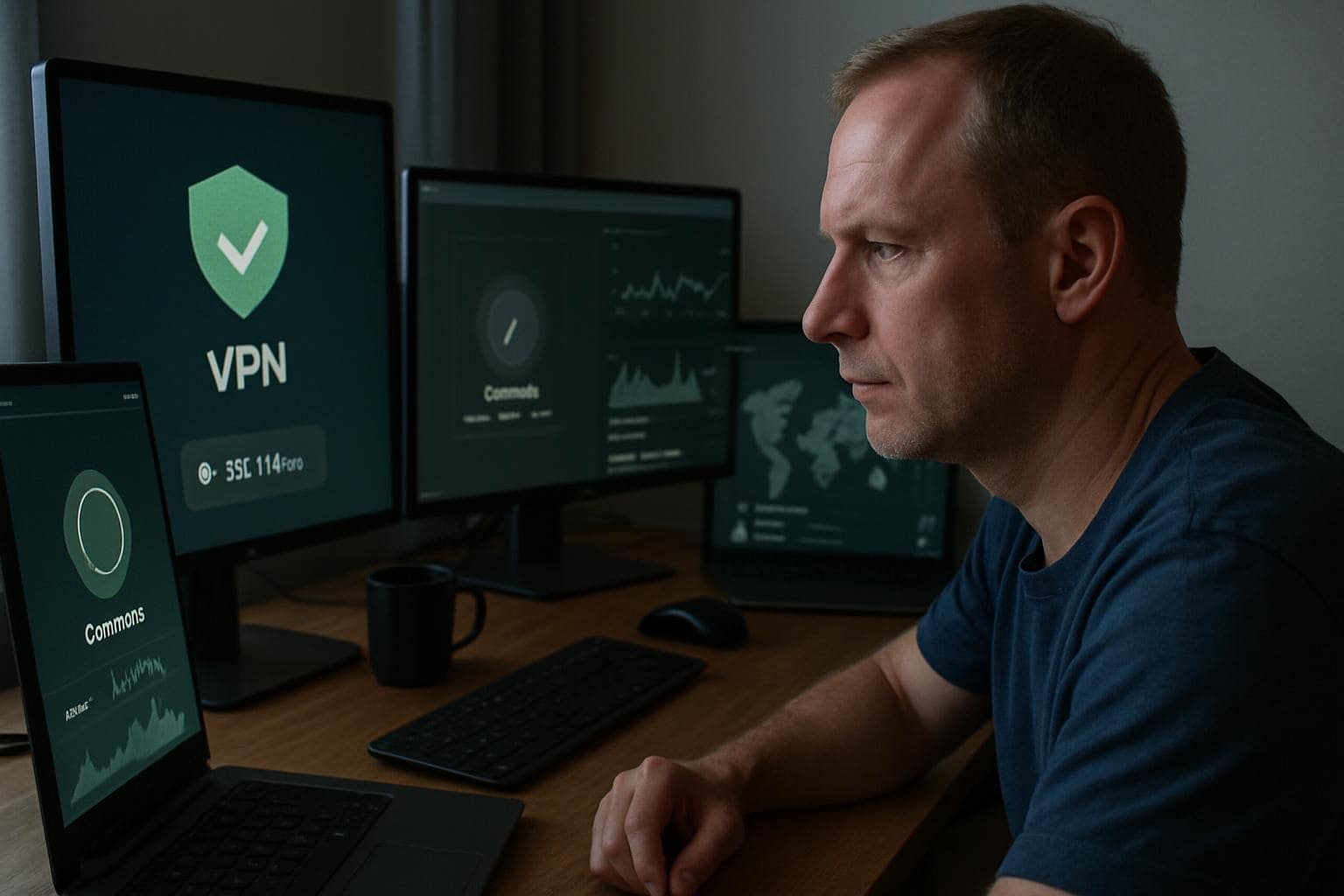
Our quick comparison chart lets you see how each free VPN stacks up for speed limits, security features, and global server options at a glance – check it out to find your perfect torrenting match!
Speed and Bandwidth
Free VPNs typically lag behind premium services in download speeds. For example, NordVPN—a paid option—offers download speeds around 0.92 MB/s. That means downloading a 264 MB file takes nearly 286 seconds.
In comparison, most free VPN providers strictly limit your data usage, making torrenting difficult.
ProtonVPN, however, provides unlimited bandwidth and has no time restrictions, making it unique among free VPN services for torrent users. On the other hand, free platforms like Windscribe cap monthly data at just 10 GB.
That might work fine for smaller downloads, but it won’t last if you regularly grab larger files.
Speed reduction is also a common issue in free VPN services. They often throttle your connection during busy periods, or once you cross a certain data limit. Reduced speeds make it harder to connect quickly to torrent swarms—and slower connection means longer downloads.
Security tools, like AES-256 encryption, can further slow VPN speeds and affect your overall performance.
Security and Privacy Features
Good security is essential for any reliable torrenting VPN. The best no-cost VPNs offer strong, military-level 256-bit AES encryption—something Windscribe provides across every server.
That’s strong enough to keep your data safe for thousands of years, even against powerful supercomputers.
A strict no-logs policy matters too—because it guarantees your VPN won’t record which files you’ve downloaded. A kill switch also helps. If your VPN connection drops unexpectedly, these switches cut your internet connection instantly, preventing accidental data leaks.
Another useful feature is DNS leak protection, which hides your true location from websites.
After trying out several free VPN services, I found that ones with RAM-only servers offered stronger privacy. RAM-based setups erase everything stored the moment servers shut down, leaving nothing behind.
NordVPN scored a solid 9.7 out of 10 for security, ranking better than most free options—but its free trial does ask for payment details right away.
Server Locations
Server location is key for fast, private torrenting. A reliable VPN should offer many servers in different countries for flexibility. The best VPN providers typically boast over 1,000 servers across 30 or more countries—great for avoiding crowded connections.
Even PrivadoVPN’s free version offers servers in 10 distinct countries, giving decent global reach for peer-to-peer file sharing.
Distance matters for torrent downloads—servers closer to you mean faster speed. Quality free VPNs let you choose exact server locations instead of random connections. Picking your own location helps dodge local ISP throttling and keeps your torrent speeds stable.
Always confirm if the free option includes torrent-friendly servers, since some providers limit peer-to-peer sharing to paid locations.
How Will Free VPNs for Torrenting Evolve in 2025?

Free VPNs for torrenting will undergo big shifts by 2025. Most providers will switch to RAM-only servers to boost their claims on privacy—making it tougher to figure out who actually protects your data.
Data logging and selling user info will become bigger risks as free VPNs search for new ways to earn money. To appear safer, many will add basic kill switch options, but they’ll limit connection locations to just two or three countries.
Expect more free VPN services to fall under the ownership of big security firms, aiming to convert you into a paying customer. I’ve already noticed this trend through my recent use of AtlasVPN—which Nord Security now owns.
Users who search the deep web for torrenting solutions should pay close attention to these changes.
No-logs policies from free VPN providers will look better on paper, yet companies will likely still collect bits of your data behind the scenes. The difference in quality between free and paid VPN services will grow—free ones will face tighter data limits and slower speeds during file-sharing activities.
Some free versions may add simple malware checks, but they’ll lack the strong security options found in paid plans. Fighting against ISP throttling will become tougher, as internet providers develop smarter methods to detect VPN usage.
For safer downloads, smart torrent users can check out premium VPNs that offer money-back trials.
People Also Ask
What makes a good free VPN for torrenting?
A solid free VPN for torrenting offers a strict no-logs policy, AES-256 encryption, and a reliable kill switch. It should provide unlimited bandwidth with no data restrictions and protect you from DNS leaks. Choose one that supports P2P-friendly servers and prevents ISP speed throttling.
Can I use Proton VPN for legal torrenting?
Yes, Proton VPN is suitable for legal torrenting. It provides RAM-only servers, reliable connection speeds, and advanced encryption. The free plan gives basic security, but upgrading to a premium plan unlocks more servers and faster connections.
Why is a kill switch important when torrenting?
A kill switch instantly cuts your internet connection if your VPN stops working, preventing accidental exposure of your IP. This feature protects your privacy and keeps your identity hidden while you’re torrenting. Without it, your IP address can become visible to others if the VPN disconnects unexpectedly.
Do free VPNs have data caps for torrenting?
Many free VPNs come with bandwidth limits, causing problems if you frequently torrent large files. Providers like Hotspot Shield typically limit monthly data usage to 500MB-10GB. Premium options normally have unlimited data and no bandwidth restrictions.
Is port forwarding necessary for torrenting?
Port forwarding boosts upload speeds and helps maintain stable connections within torrent groups. Private Internet Access (PIA) is among the few VPN providers offering this option. Not every torrenting session requires port forwarding, but it can improve download speeds and benefit private tracker users.
How do I check if my VPN has DNS leak protection?
To test DNS leak protection, connect to your VPN and visit a reliable leak-testing website. If the test results reveal your actual IP address or provider details, your VPN isn’t secure. Quality services like Private Internet Access feature built-in DNS leak protection, plus multiple secure protocols, such as L2TP/IPsec, for added safety.
References
https://www.pcworld.com/article/624123/best-vpn-for-torrenting.html
https://www.provendata.com/blog/does-vpn-protect-from-hackers/
https://protonvpn.com/free-vpn?srsltid=AfmBOorEwIz3miLySU0XZUJi9ZUtL_yScNc9SyX-fZK86GjSj8uJqu-5
https://vpnoverview.com/best-vpn/best-free-vpn-for-torrenting/
https://cybernews.com/best-vpn/free-vpn-for-torrenting/ (2025-04-17)
https://www.security.org/vpn/best/free-torrenting/ (2025-02-11)
https://www.uscybersecurity.net/top-5-risks-of-using-free-vpns/
https://www.vpnmentor.com/amp/blog/the-best-really-free-vpns-for-android/
https://thebestvpn.com/reviews/avira-phantom/
https://www.cyberghostvpn.com/
https://travelsecurely.com/best-free-vpn-for-torrenting/
https://cybernews.com/best-vpn/nordvpn-review/free-trial/
https://www.expressvpn.com/?srsltid=AfmBOop-E9ewl_WjPa-g8T7BzifhPb5Cr4lw7ZORtmgh0BcCDgjheA-k
